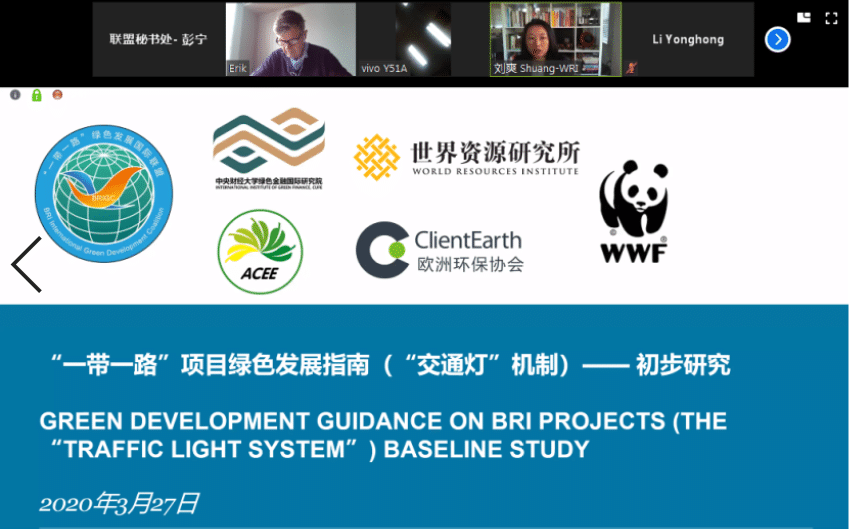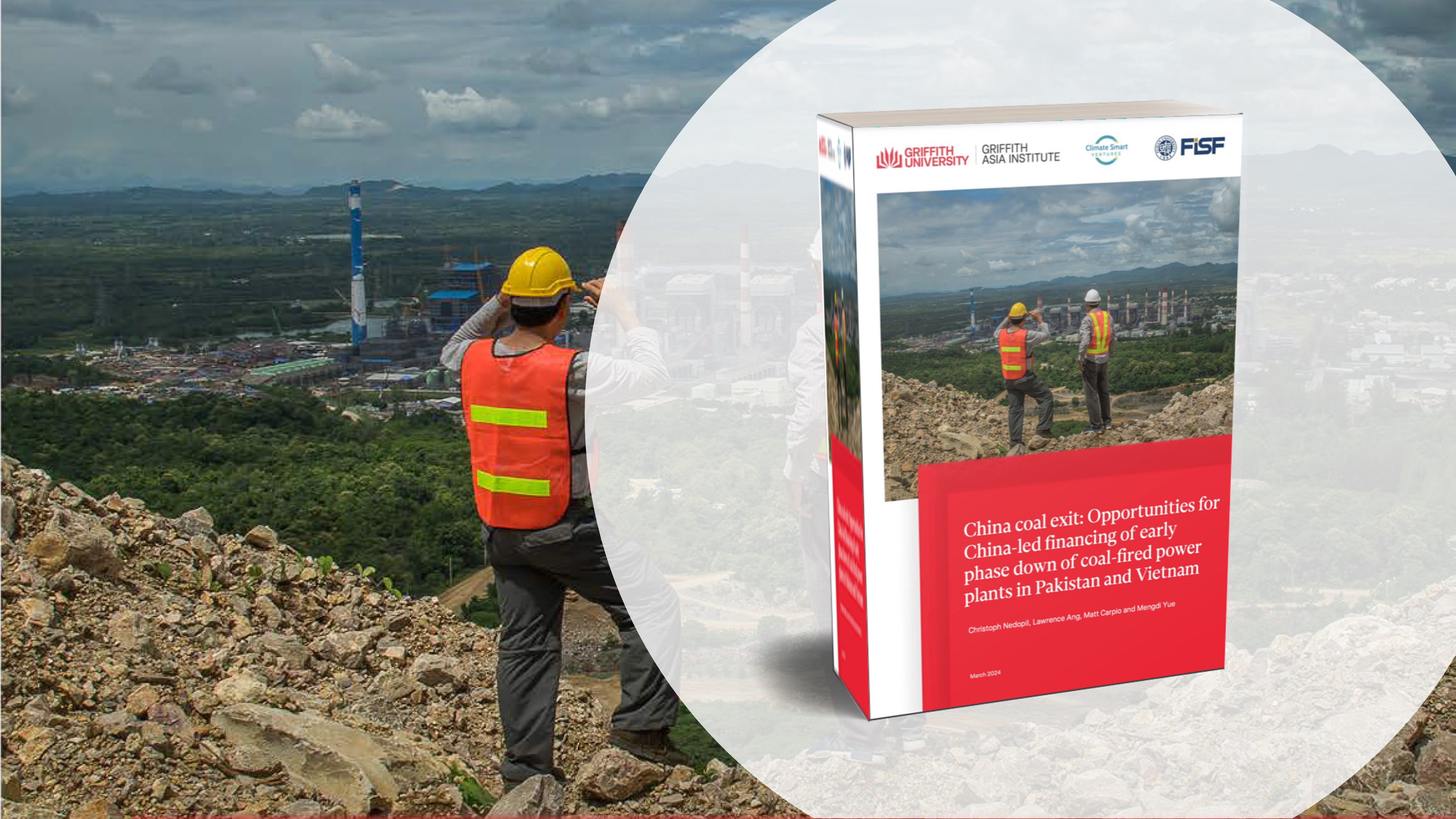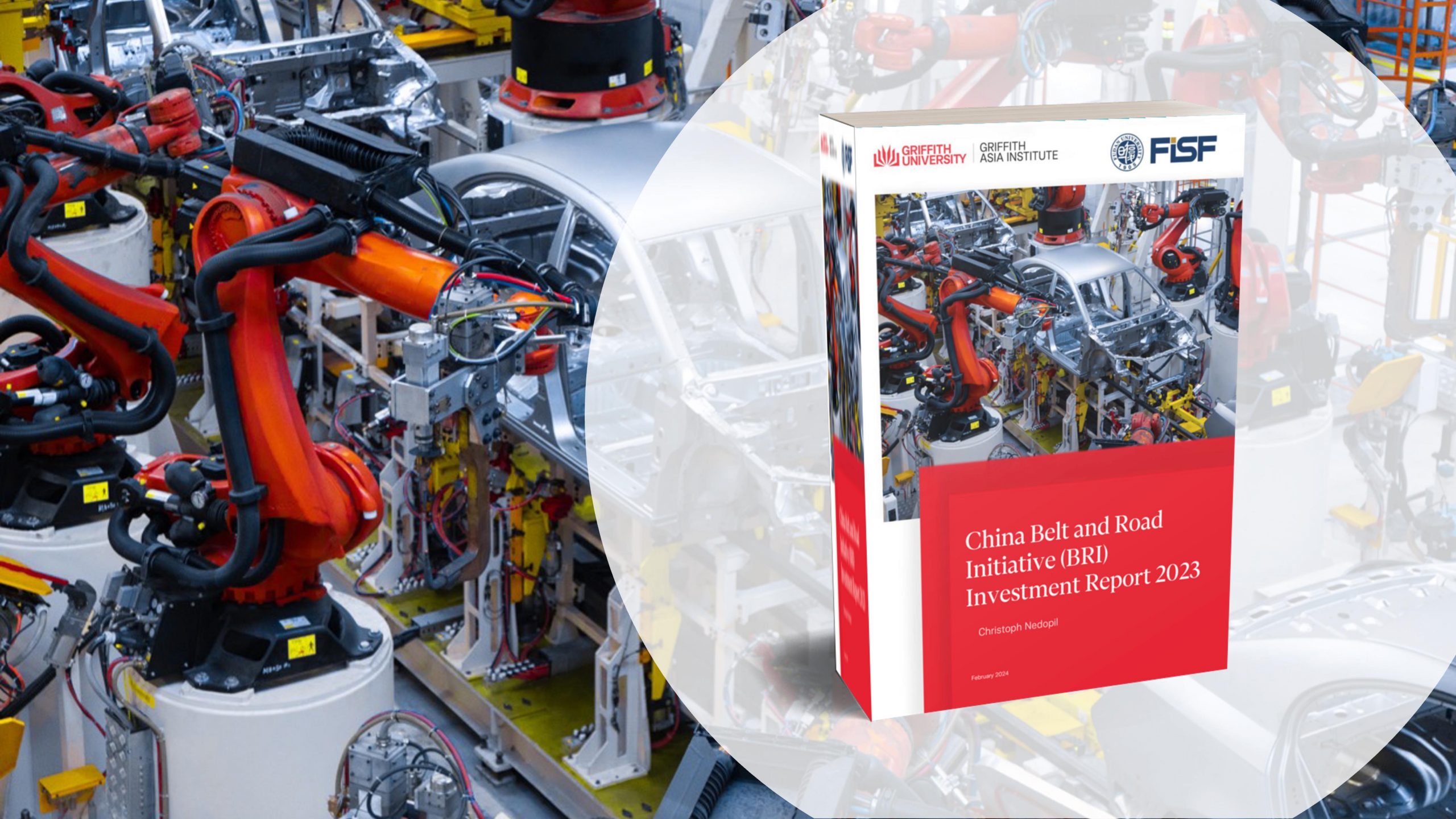On March 27, 2020, the First Consultation Meeting of Joint Research on “Green Development Guidance for BRI Projects” (the “Green Light” System) was held via videoconference.
The BRI “Green Light System” aims to explore the formulation of guidelines on the assessment and classification of BRI projects and provide guidance for stakeholders to further recognize and address ecological and environmental risks in overseas investment. Dr. Christoph Nedopil Wang, Director of the Green BRI Center of the International Institute of Green Finance together with researchers from the World Resources Institute (WRI), Climate Bond Initiative, WWF and ACCE have compiled the “baseline study” to share recommendations based on Chinese and international best practice of green and sustainable finance.
The BRI International Green Development Coalition (BRIGC) officially launched the Joint Research on “Green Development Guidance for BRI Projects” in December 2019.
The meeting was jointly hosted by the Secretariat of BRI International Green Development Coalition (BRIGC), ClientEarth and World Resources Institute (WRI). Erik Solheim, Convener of the Advisory Committee of BRIGC, Advisor of WRI, Ye Yanfei, Counsel (Director-General Level) of the Policy Research Bureau of the China Banking and Insurance Regulatory Commission (CBRC), Ma Jun, BRIGC Advisor, Director of Center for Finance and Development at Tsinghua University, Zhang Jianyu, International Liaison of the Advisory Committee of BRIGC, Vice President of Environmental Defense Fund (EDF), and Li Yonghong, Deputy Director General of Foreign Environmental Cooperation Center (FECO) attended the webinar. Over 50 representatives from more than 10 international and domestic agencies joined the on-line discussion, including the Belt and Road Construction Promotion Center of National Development and Reform Commission of China (NDRC), Appraisal Center for Environment and Engineering (ACEE) of the Ministry of Ecology and Environment of China (MEE), Modern Finance Research Institute of Industrial and Commercial Bank of China (ICBC), Tsinghua University, Central University of Finance and Economics, WWF, EDF, Asian Infrastructure Investment Bank (AIIB), International Finance Corporation (IFC), Children’s Investment Fund Foundation (CIFF), and Climate Bonds Initiative (CBI), etc.
The Consultation Meeting was then designed to collect expert views and opinions on the preliminary outcomes and provide guidance and reference for further improving the research.
Solheim noted in his remarks that it is vital to promote the revitalization of the global economy and further expedite the development of green economy after the COVID-19 pandemic. Against this background, the “Green Light” System research is quite meaningful in the practical sense. It will help China and other countries to improve their standards and degree of green development and jointly facilitate the construction of a green Belt and Road.
Li Yonghong highlighted in the opening address that the stimulus packages on the economy in the mid of and after the pandemic marked challenges as well as opportunities for green development on the Belt and Road. The “Green Light” System research focuses on providing green solutions and offering reference for stakeholders such as the government departments, financial institutions and enterprises in China and BRI participating countries.
Representative experts and research teams from WRI, WWF, and ACEE introduced the specific goals of the baseline study, current progress and suggestions.
Dimitri de Boer, Chief Representative of ClientEarth in China chaired the consulting session. Ye Yanfei suggested that the responsibilities of all parties in the BRI projects should be clarified, and put forward recommendations on the technical standards, project classification, and implementation of the “Green Light” System. Fang Li, Chief Representative of WRI Beijing Representative Office suggested that positive inventories should be developed and implemented for different recipient countries based on China’s domestic practice experience. Ma Jun proposed specific suggestions on the implementation and coordination of the “Green Light” System across departments and industries.
Zhang Jianyu, International Liaison of the Advisory Committee of BRIGC, Vice President of Environmental Defense Fund (EDF), Yin Hong, Deputy Head of the Modern Finance Research Institute at ICBC, Zhu Xufeng, Associate Dean of School of Public Policy and Management, Tsinghua University, Zhao Kun, Director of Policy Research Division, the Belt and Road Construction Promotion Center of NDRC, Henri de Branche, Environmental Specialist at AIIB, and Yuan Wei, Advisor on Environment, Social & Governance of IFC, etc., proposed specific comments and suggestions on the potential environmental and social risks of BRI-financed projects, as well as the means to improve the baseline study and design an effective “Green Light” System.
The original article was posted on the BRI GC website




Comments are closed.